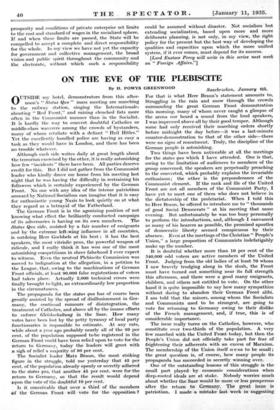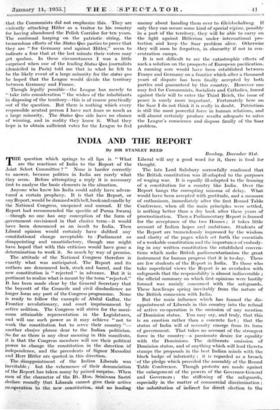ON THE EVE OF THE PLEBISCITE
By H. POWYS GREENWOOD Saarbrucken, January 6th.
OUTSIDE my hotel, demonstrators from this after- noon's " Status Quo " mass meeting are marching to the railway station, singing the Internationale, shouting " Red Front," and raising clenched fists more often in the Communist manner than in the Socialist. It is hardly the way to convert doubtful Catholics or middle-class waverers among the crowds of bystanders, many of whom retaliate with a defiant " Heil Hitler." Yet the excellently handled police are having as easy a task as they would have in London, and there has been no trouble whatever.
Although each side writes daily at great length about the terrorism exercised by the other, it is really astonishing how few " incidents " there have been. All parties deserve credit for this. But I did not.gather from the Communist leader who kindly drove me home from his meeting last night that he was having the difficulty in restraining his followers which is certainly experienced by the German Front. No one with any idea of the intense patriotism aroused by National Socialism can imagine that it is easy for enthusiastic young Nazis to look quietly on at what they regard as a betra.3411 of the Fatherland.
The German Front is in the agonizing position of not knowing what effect the brilliantly conducted campaign of its adversaries is having on its own members. The Status Quo side, assisted by a fair number of emigrants and by the extreme .left-wing influence in all countries, is outdoing Herr Goebbels at his best ; it has the best speakers, the most vitriolic pens, the powerful weapon of ridicule, and I really think it has won one of the most astonishing competitions in sheer falsehood I ever expect to witness. Even the neutral Plebiscite Commission was moved to indignation at the allegation, in a petition to the League, that, owing to the machinations of German Front officials, at least 90,000 false registrations of voters had taken place. Actually 2,000 technical errors were finally brought to light, an extraordinarily low proportion in the circumstances.
The propaganda for the status quo has of course been greatly assisted by the spread of disillusionment in Ger- many, the continual rumours of disintegration, the treatment of Catholics, and above all by the insane efforts to enforce Gleichschaltung in the Saar. How many votes have been lost by the petty tyranny of local party functionaries is impossible to estimate. At any rate, while about a year ago probably nearly all of the 98 per cent. of the population supposed to be registered in the German Front could have been relied upon to vote for the return to Germany, today the leaders will greet with a sigh of relief a majority of 80 per cent.
The Socialist leader Matz Braun, the most striking figure in the struggle, told me yesterday that 45 -per cent. of the population already openly or secretly adhered to the status quo, that another 45 per cent. were for-the return to Germany, so that the result would depend upon the vote of the doubtful 10 per cent.
Is it conceivable that over a third of the members Of the German Front will vote for the- opposition 1 For that is what Herr Braun's statement amounts to. Struggling in the rain and snow through the crowds surrounding the great German Front demonstration this morning, many of whom never caught a glimpse of the arena nor heard a sound from the loud speakers, I was impressed above all by their good temper. Although some had only received their marching orders shortly before midnight the day before—it was a last-minute counter-demonstration to that of the other side—there were no signs of resentment. Truly, the discipline of the German people is astonishing.
Two things have been noticeable at all the meetings for the status quo which I have attended. One is that, owing to the limitation of audiences to members of the group concerned, the speakers are perpetually preaching to the converted, which probably explains the invariable enthusiasm; the other is the preponderance of the Communist element. If the rank and file of the United Front are not all members of the Communist Party, I have yet to meet one of them who does not believe in the dictatorship of the proletariat. When I told this to Herr Braun, he offered to introduce me to " thousands of good Social Democrats " at his meeting that same evening. But unfortunately he was too busy personally to perform the introductions, and, although I canvassed as many of his hearers as possible, the promised apostles of democratic liberty seemed conspicuous by their absence. Evert at the meetings of the Christian " People's Union," a large proportion of Communists indefatigably make up the number.
It is doubtful whether more than 10 per cent of the 540,000 odd voters are active members of the United Front. Judging from the old ladies of at least 70 whom I saw bravely trudging along in the slush, the Front must have turned out something near its full strength this afternoon, and there were a good many emigrants, children, and others not entitled to vote. On the other hand it is quite impossible to say how many sympathize without daring to abandon their German Front alibi.
I am told that the miners, among whom the Socialists and Communists used to be strongest, are going to vote for returning to Germany owing to their dislike of the French management, and, if true, this is of considerable importance.
The issue really turns on the Catholics, however, who constitute over two-thirds of the population. A very few marched with the United Front today, but then the People's Union did not officially take part for fear of frightening their adherents with an excess of Marxism. The membership of the Union itself seems to be small ; the great question is, of course, how many people its propaganda has succeeded in secretly winning over.
One of the outstanding lessons of this struggle is the small part played by economic considerations when deep-rooted ideals are at stake. Nobody worries much about whether the Saar would be more or less prosperous after the return to Germany. The great issue is patriotism. I made a mistake last week in suggesting that. the Communists- did not emphasize _this, They are violently attacking Hitler as a •traitor. to: his• country for having abandoned the Polish Corridor for' ten years. The continual harping • on the patriotic. string, the • tremendous efforts of-the Status. Quo parties to prove that they are -" for Germany and against -Hitler," seem to - indicate a fear that at the last minute their.votersmay get qualms. In these circumstances I was a little surprised when one of the leading Status. Quo journalists (domiciled in Paris) told me that in what he felt to be the likely event of a large:minority for the status quo he hoped that the League would divide the territory between. Germany and France.
Though legally possible—the League has merely to " take into consideration " the wishes of the inhabitants in disposing of the territory—this is of course practically out of the question. But there is nothing which every responsible neutral person I have met fears so much as a large minority. The Status .Quo side have no chance of winning, and in reality they know it. What they hope is to obtain sufficient votes for the League to feel uneasy about handing them- over to Gkiehschaltung. If only they can secure some kind of special regime, possibly in a- part-Of the territory, they will be able to carry on the fight against Hitlerism under : international pro- tection and -keep. the Saar problem alive. Otherwise - they will soon be forgotten, in obscurity if not in con- - centration camps. - It is not difficult to see the catastrophic effects of such a solution on the prospects of European pacification. A running sore would have been established between France and Germany on a frontier which after a thousand years of dispute has been finally accepted by both parties and guaranteed by this country. However one may feel for Communists, Socialists and Catholics, forced against their will to enter the Third Reich, the issue of peace is surely more important. Fortunately here on the Saar I do not think it is really in doubt. Patriotism is still the most powerful force in human relations, and will almost certainly produce results adequate to salve the League's conscience and dispose finally of the Saar problem.







































 Previous page
Previous page